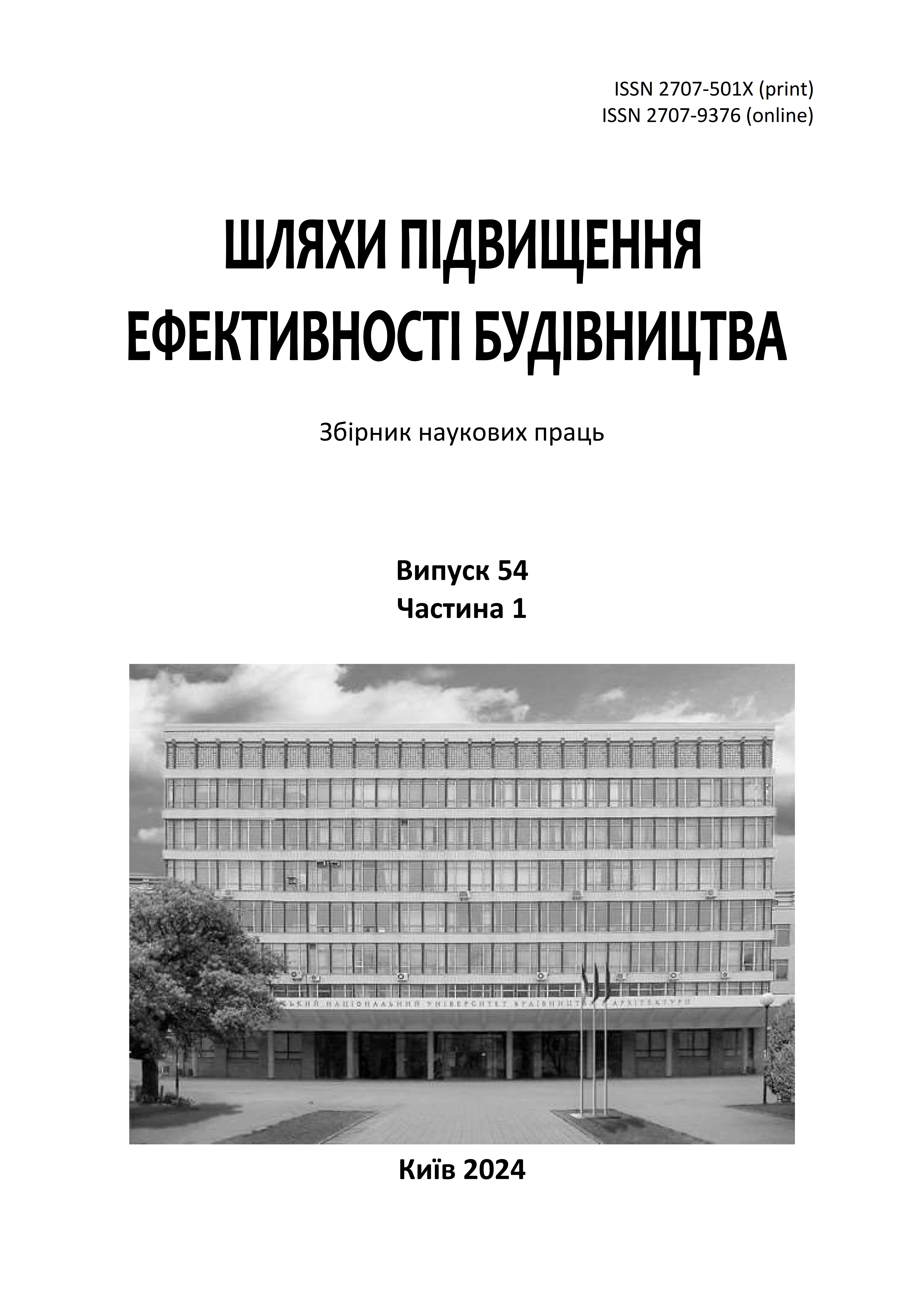Analysis of technologies for restoring the serviceability of reinforced concrete ceiling structures
DOI:
https://doi.org/10.32347/2707-501x.2024.54(1).44-56Keywords:
reinforced concrete structures, restoration, strengthening, repair, technology, analysisAbstract
As a result of military operations, a significant part of construction objects was damaged by off-design impacts. Among the damaged structures, a significant proportion is accounted for ceiling. In our case, majority of ceilings are made of hollow-core reinforced concrete slabs. According to the current regulatory documents, some of these ceilings are subject to restoration. Therefore, the analysis and identification of the most rational and effective technologies for restoring the operational suitability of damaged building structures, in particular, ceilings, is an urgent task today. The article analyzes the known classical and new technologies for repairing and strengthening reinforced concrete slabs, including: dismantling damaged slab and following production of the plate in-place; applying cement-based repair mortars; repairing with epoxy materials; strengthening structures with carbon or basalt materials; classical technologies (bringing metal unloading beams from above (below), installing double-cantilever unloading beams, installing tie bars, creating indistinguishability of beams, building up the beams, etc.). The advantages and disadvantages of each of the technologies, both structural and technological, were identified. The analysis shows that the existing methods are aimed either at repairing damage or at strengthening defect-free structures. Therefore, the development of new or improvement of known technologies for the comprehensive restoration of hollow core slabs is an urgent task. However, taking into account the types of damage to hollow-core slabs as a result of off-design impacts, a new or improved technology for their comprehensive restoration is currently needed. At the same time, such a technology should be structurally and technologically reasoned.
References
Molodid O.S., Kovalchuk O.Yu., Skochko V.I., Plokhuta R.O., Molodid O.O., Musiiaka І.V. Inspection of war-damaged buildings and structures by the example of urban settlement borodianka. Опір матеріалів і теорія споруд. 2023. № 110. С. 328-343. DOI: 10.32347/2410-2547.2023.110.328-343
ДСТУ Б В.3.1-2:2016. Ремонт і підсилення несучих і огороджувальних будівельних конструкцій та основ будівель і споруд. [Чинний від 2017-04-02]. Київ: ДП «Державний науково-дослідний інститут будівельних конструкцій» (НДІБК), 2016. 68 с.
EN 1504 «Product and system for the protection and repair of concrete structures – Definitions, requirements, quality, control and evaluation of conformity». Was approved by CEN on 27 June 2005. 214 s .
Білик С.І., Тонкачеєв Г.М. Видалення збірних плит перекриття в каркасних будівлях. Будівельні конструкції. Теорія і практика. 2018, №2. С. 67–72. DOI: 10.32347/2522-4182.2.2018.67-72.
Gergess A., Shabab M., Massouh R. Repair of severely damaged reinforced concrete beams with high-strength cementitious grout. Transportation Research Record: Journal of the Transportation Research Board. 2020, 2674(5):036119812091911. DOI: 10.1177/0361198120919116.
Puskas A., Corbu O., Köllő S. Testing on concrete surface repair with tri component epoxy resin system. 2017, Р. 245-250.
Спосіб влаштування вогне- та термозахисту конструкцій, що підсилені зовнішнім армуванням, приклеєним на клей з низькою вогне- та термостійкістю: пат. № 149375 Україна: E04B1/94. № u202103628, заявл. 24.06.2021, опубл. 10.11.2021, бюл. № 45/2021, 3 с.
Structural strengthening manual. Cutting-edge systems and solutions for the repair and static / seismic upgrading of buildings using fibre reinforced composites. URL: https://files.brintex.com/Occurrence/358/Brochure/10584/brochure.pdf
Бейнер А. SikaCarboDur System: Технологічний регламент. 2-ге вид. 2014. 16 с.
Бейнер А. SikaWrap: Технологічний регламент. Сухий спосіб монтажу. 2-ге вид. 2013. 16 с.
Haddad R., AL-Mekhlafy N., Ashteyat A. Repair of heat-damaged reinforced concrete slabs using fibrous composite materials. Construction and Building Materials. 2011, 25(3): 1213-1221. DOI: 10.1016/j.conbuildmat.2010.09.033
Савйовський В.В., Молодід О.С., Малець Н.О. Підсилення залізобетонних балочних конструкцій зовнішнім армуванням. Управління розвитком складних систем. 2017. № 29. С. 198-203.
Wan-Yang G., Ke-Xu H., Jian-Guo D., Kun D., Ke-Quan Y., Li-Jing F. Repair of fire-damaged RC slabs with basalt fabric-reinforced shotcrete. Construction and Building Materials. 2018, Volume 185, P. 79-92. DOI: 10.1016/j.conbuildmat.2018.07.043
Савйовський В.В. Реконструкція будівель і споруд: навч. посіб. Київ: Ліра-К, 2020. 320 с.
Обстеження та підсилення будівельних конструкцій промислових будівель: навч. посіб. / Прядко М.В., Руднєва І.М., Прядко Ю.М.; за заг. ред. М.В. Прядко. Київ: КНУБА, 2018. 331 с.
Молодід О.С. Система формування конструктивно-технологічних рішень відновлення експлуатаційної придатності будівельних конструкцій: автореф. дис. на здобуття наук. ступеня д-ра техн. наук: 05.23.08. Київ: КНУБА, 2021. 38 с.
Шарикіна Н.В. Технологія відновлення захисного шару залізобетонних конструкцій: дис. ... д-ра філософії: 192 «Будівництво та цивільна інженерія. Київ: КНУБА, 2023. 190 с.
Molodid O., Sharykina N., Plokhuta R., Molodid O., Musiiaka І. Research of restoration technology of the clear cover of reinforced concrete structures. Journal of Technology, 2023, Volume 38, Issue 4, Р. 243-251.
Downloads
Published
How to Cite
Issue
Section
License

This work is licensed under a Creative Commons Attribution 4.0 International License.
Authors who publish with this journal agree to the following terms:
- Authors retain copyright and grant the journal right of first publication with the work simultaneously licensed under a Creative Commons Attribution License that allows others to share the work with an acknowledgement of the work's authorship and initial publication in this journal.
- Authors are able to enter into separate, additional contractual arrangements for the non-exclusive distribution of the journal's published version of the work (e.g., post it to an institutional repository or publish it in a book), with an acknowledgement of its initial publication in this journal.
- Authors are permitted and encouraged to post their work online (e.g., in institutional repositories or on their website) prior to and during the submission process, as it can lead to productive exchanges, as well as earlier and greater citation of published work (See The Effect of Open Access).

